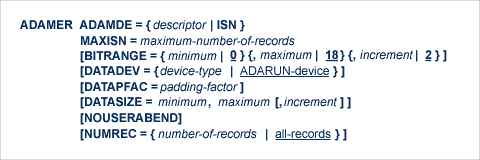
This document describes the syntax and parameters of the ADAMER utility.
Specifies the descriptor to be used as the ADAM key. If ISN is specified, ADAMER uses the ISN of each input record as input for the randomization algorithm.
The ADAM descriptor must be found in the field definition table (FDT) and be defined as a unique descriptor (UQ). It cannot be a sub-, super-, hyper-, collation, or phonetic descriptor. The descriptor also cannot specify the NU option, cannot be an MU field or a field within a periodic group, and cannot be a variable-length field.
The total number of records expected to be contained in the file.
MAXISN should include the number of records to be originally loaded plus the number of records that are likely to be added to the file.
The minimum, maximum, and incremental number of bits to be truncated from each ADAM descriptor value before the value is used as input to the ADAM randomization algorithm. Bits are always truncated from the rightmost portion of the compressed value.
A maximum of 20 different bit truncations is permitted for each ADAMER execution.
The following specification results in the truncation of 0 bits, 2 bits, and 4 bits for each Data Storage size for which statistics are provided.
BITRANGE=0,4,2
If this parameter is omitted, a default BITRANGE equal to 0,18,2 is used.
The device type to be used for Data Storage. If DATADEV is not specified, the device type specified by the ADARUN DEVICE parameter is the default.
The Data Storage padding factor to be used for the file. The number specified represents the percent of each Data Storage physical block that is not to be used during initial file loading. A value in the range 1-90 may be specified.
If this parameter is omitted, a padding factor of 10 percent is used during ADAMER execution.
The Data Storage sizes, in cylinders, for which ADAM statistics are to be provided. A maximum of four Data Storage sizes can be calculated per ADAM execution. The minimum and maximum values may be specified without the increment. ADAMER calculates two increments to produce a report based on all four values.
The following specification results in statistics for Data Storage sizes of 100, 125, 150, and 175 cylinders.
DATASIZE=100,175,25
If DATASIZE is omitted, ADAMER provides statistics for four Data Storage sizes as follows:
| Size 1: | The first 100 input records are read and the Data Storage size requirement is based on the ADAM descriptor values present in these records and the value specified for MAXISN. The resulting Data Storage size is used as Data Storage Size 1. |
|---|---|
| Size 2: | Data Storage Size 1 x 1.33. |
| Size 3: | Data Storage Size 2 x 1.33. |
| Size 4: | Data Storage Size 3 x 1.33. |
When an error is encountered while the function is running, the utility prints an error message and terminates with user abend 34 (with a dump) or user abend 35 (without a dump).
If NOUSERABEND is specified, the utility will not abend after printing the error message. Instead, the message "utility TERMINATED DUE TO ERROR CONDITION" is displayed and the utility terminates with condition code 20.
The maximum number of records to be read from the input file. If NUMREC is not specified, all records are read.
ADAMER ADAMDE=CC, ADAMER DATADEV=3350,DATASIZE=50,110,20, ADAMER DATAPFAC=10,MAXISN=225000,BITRANGE=2,6,1
The ADAM descriptor is CC. Model 3350 device type is to be used for Data Storage. Statistics for Data Storage sizes of 50, 70, 90, and 110 cylinders are to be provided. Data Storage padding factor of 10 percent is to be used. The planned number of records for the file is 225,000. For each Data Storage size, statistics are to be provided for bit truncations of 2, 3, 4, 5, and 6 bits.
ADAMER ADAMDE=CD,DATADEV=3380,DATAPFAC=5,MAXISN=80000
The ADAM descriptor is CD. Model 3380 device type is to be used for Data Storage. Data Storage padding factor of 5 percent is to be used. The planned number of records for the file is 80,000. Default values are to be used for all other parameters.